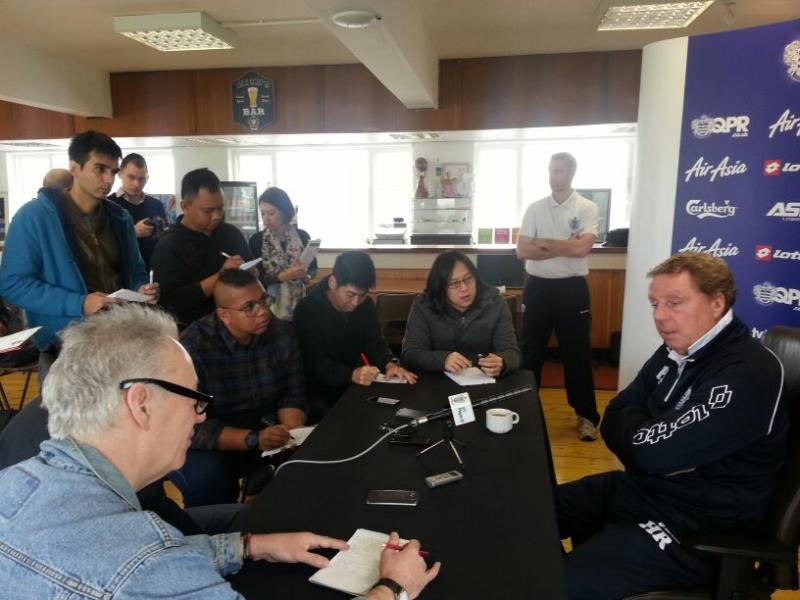By IAN YEE
alltherage@thestar.com.my
WHEN we told some British sports journalists during the Laureus World Sports Awards (held in Kuala Lumpur two weeks ago) that we would be interviewing Harry Redknapp, they had a few words of warning.
“He can explode,” said one of them. “Don’t ask him stupid questions.”
Of course, we had already seen that video of Redknapp, usually so candid and forthcoming, tearing into a reporter who had unwittingly called him a “wheeler dealer”.
But when we met the Queen’s Park Rangers manager – once touted as the next England boss – at the club’s training ground in London, we found him in a significantly better mood, despite QPR facing an uphill battle for automatic promotion to the Premier League after their relegation last year.

QPR manager Harry Redknapp speaking to reporters, including R.AGE editor Ian Yee (second from right), at QPR’s training ground in London.
You have an impressive record with developing young talents into superstars (Gareth Bale, Rio Ferdinand, Frank Lampard, etc.). What’s your secret?
It’s the player – they have to have the talent. If they don’t, it’s very difficult to get the best out of them. It’s like with Ravel Morrison (West Ham United centre forward currently on loan at QPR) – he needs to push himself, but he also needs someone to believe in him. If you believe in him, and he works hard, he can be one of the best players in the Premier League for sure.
Are you surprised no one has been able to nurture Morrison the right way, considering his troubles off the pitch?
Everybody knows what he can do; it’s just Ravel’s got to do it for himself. He’s had some good managers. He has really just got to concentrate on his football, keep his head down and work hard, and do it consistently. He if does that, he has the ability to be one of the best players around. There’s no doubt about that.
He glides over the floor. When he runs, he almost doesn’t touch the floor. And he’s got unbelievable ability with the ball to beat people and do special things. He’s a really top class talent.
Tell us what you think about the AirAsia QPR Coaching Clinic, which has seen four Malaysians training in the club over the past week?
It’s very important. It’s a world game now. I’m sure in Malaysia, with Tony (Fernandes) as the chairman of the club, we get a good following. So, it’s important we make good relationships. It’s been a pleasure to have the boys here training. I hope they’ve enjoyed it.
What do you hope this programme will do for QPR and Malaysian football?
I’m sure there’s talent in Malaysia; there has got to be. There’s talent all over the world now. Players now come from so many different parts of the world, so it’s good that we’ve got a tie-up with Malaysia. I’m sure there’s some talent there, so it’s good.
I think it’s important if we can get some coaches there as well, go out and spend a week over there, maybe do some coaching. We have a good relationship with the chairman, (so) we can do that.
How has football management changed over the years?
Obviously, you’re dealing with different players now. You’re dealing with players who’re making big money. Years ago, it was much easier. Players didn’t have agents. You just dealt with the player, and at the end of the year, you gave the player a new contract, maybe you have a small rise. Now, every deal is difficult because of the agents.
The good part is I don’t have to deal with it. The chief executive and the chairman, they deal with the agents and they do the deals. So yeah, it’s changed an awful lot now.
Players are very different. They get looked after differently. They have everything. The pitches are better, the food is better, they got masseurs, they got fitness coaches – everything is different. Everything.
When I first started playing, you didn’t even have goalkeeping coaches. You’d just call the goalkeepers over when you’re doing some shooting, and they’d be in goal, and you’d shoot at them. No one coached them. That came in later on.
Players didn’t used to warm up on the pitch, either. That only came later, probably around 1970, when players (started) going out to warm up. That didn’t use to happen. We’d sit in the dressing room, and four to five minutes before kick-off, you’d go onto the pitch, the captain would do the toss up, there would be two or three balls and the players will pass it around and just stand around waiting to start the game. We didn’t even stretch.
How do you think young managers should deal with these changes?
The young managers have been brought up with it. They don’t know any different. When you’ve been around you see the changes over the years, but most of the younger managers have been players, so they’ve been brought up with the way it is now, you know? But at the end of the day, the game hasn’t changed – it’s still about having good players – good professionals, good players. You have that, you have a chance. The best teams have the best players.

Tell us what you think!